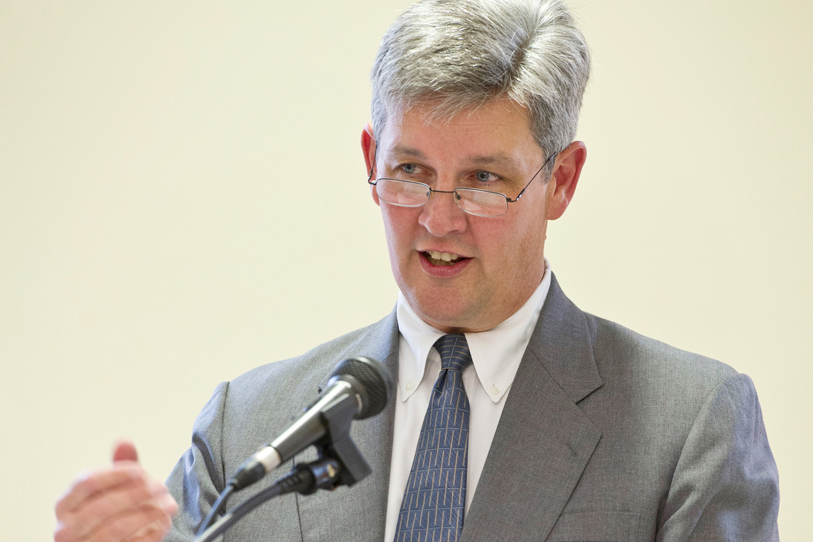With thousands of lawyers and judges in Turkey arrested without charge, detained indefinitely, and denied meaningful access to counsel after an attempted military coup in July, the American Bar Association on August 9, 2016 adopted an important resolution in support of the detainees and the rule of law. The report submitted to the ABA in connection with the resolution was written by three lawyers with Boston College Law School connections.
“This is a powerful statement, given by the largest association of lawyers in the world, that we hope will be heard around the world,” says Kevin J. Curtin ’88 (pictured above), an adjunct professor at BC Law and chair of the Committee on Appellate and Habeas Practice for the American Bar Association Criminal Justice Section.
The ABA resolution provides that any detained judge, lawyer, or other individual who is held without evidence establishing reasonable grounds to believe that the individual has committed a crime should be immediately released.
“The resolution calls for nothing more than is required under well-established international law,” explains Curtin, who on August 15 authored an op-ed in the Boston Herald about the crisis. “We hope that the Turkish government will honor its commitment to the rule of law and constitutional democracy. But even if this call for action goes unheeded by the Turkish government, it will be heard by others, around the world, and especially the families of those who have been improperly detained and possibly even the detainees themselves. That is reason enough for the ABA to speak out.”
The resolution further calls upon the Turkish government to provide fair hearings for any judge or lawyer who may be dismissed or suspended from their positions.
“There is no question,” states the report, “that the suspensions of the judges, which occurred within hours of the failed coup, were ordered without an opportunity for a hearing, for reasons unrelated to the individual judges’ capacity, and without any showing that any judge was involved with the attempted coup.”
The ABA resolution also calls on the Turkish government to meet its obligations to protect human rights, including freedom of speech and of the press, and to abide by the prohibition against torture. It urges the Turkish government to ensure that all measures taken in derogation of its obligations to protect human rights under international treaties are only those absolutely required by the exigencies of the situation, and calls upon it to meet its reporting obligations under those treaties.
“We are friends of Turkey and of the Turkish people; adherence to rule of law and human rights guarantees are our priority,” says Susan Simone Kang, director of Graduate Legal Education and International Programs at BC Law and organizer of the report writing team at Boston College. “We cannot, even in a time of emergency, stand by silently while critical safeguards are swept away by decree, and human beings suffer terrible consequences as a result. This is why legal safeguards exist in the first place. We are attempting to raise awareness of what has been reported by human rights groups as severe violations of the detainees civil rights.”
On July 15, a group of Turkey’s military officers attempted to overthrow the government of President Recep Tayyip Erdogan. The failed coup attempt led to a state of emergency and issuance of a decree that has permitted a crackdown by the Turkish government and the detention or arrest of many thousands of people, including more than 3,000 judges and lawyers.
Human rights organizations have reported that the detainees have experienced torture, incommunicado detention, lack of access to counsel, delays in being advised of the charges against them, rights to a fair trial, and grossly inadequate medical care, all of which are guaranteed under international obligations, even in a state of emergency.
“I hope that the resolution will make Turkey realize how much the post-coup witch hunt violates the country’s human rights commitments,” says Kathleen Hamill ’97, who teaches human rights and international law with the Fletcher School at Tufts University and is a fellow at the FXB Center for Health and Human Rights at Harvard University.
“Hopefully, this resolution will encourage Turkey to release each and every individual detained unjustly without evidence of a crime. Leaders there need to know not only that the world is watching but that the American legal community is standing in solidarity with those judges, lawyers, journalists, and others who have been arbitrarily detained without due process and without meaningful access to counsel,” Hamill says. “This resolution is the voice of individual US citizens and was not written, backed, or published by the US government.”
While some might think the thoughts of American lawyers may have little influence in a country more than 6,000 miles away, Simone Kang thinks differently.
“We are trying to urge the government to be more transparent about the process, to adhere to their legal obligations, and to treat neither the guilty nor the innocent in this fashion,” Kang argues. “We hope to encourage a dialogue among all interested persons, and we pray for the people of Turkey that they can balance preserving their democracy, while also protecting their national security concerns.”
Photograph by Christopher Soldt, MTS, BC


